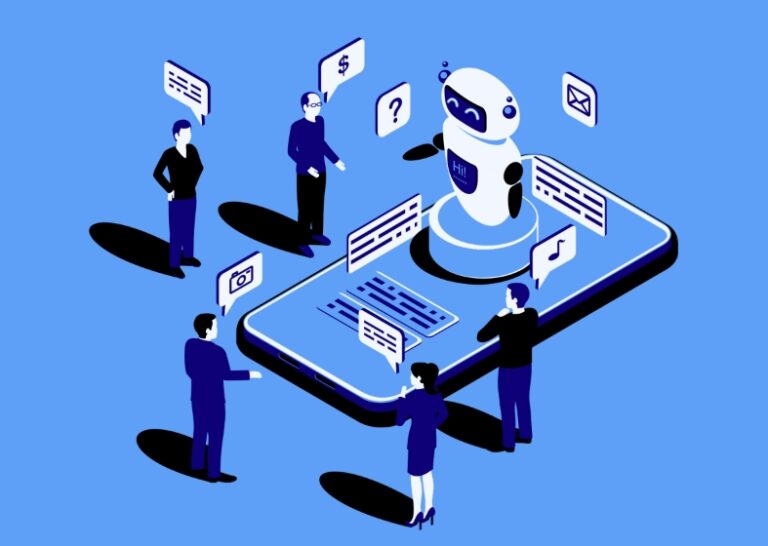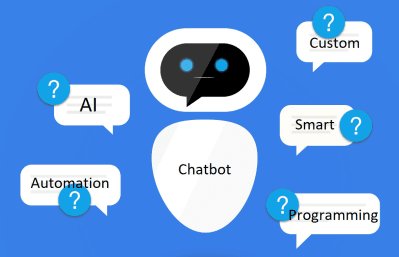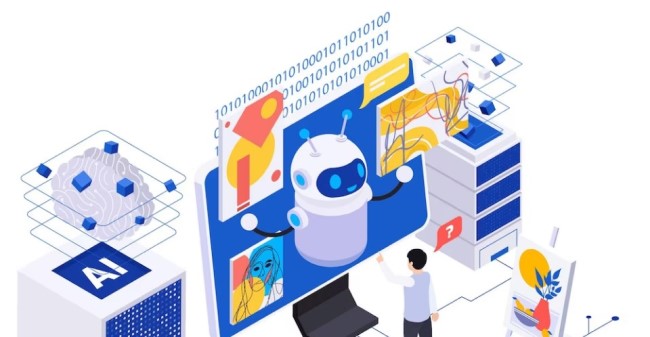How AI Question Answering Chatbots are Reshaping Business Communication
AI Question Answering chatbots seamlessly incorporate artificial intelligence for customer interactions and change how commercial communication functions.
In simple words, AI Question Answering uses the power of AI algorithms and natural language processing to interpret and respond to user inquiries. It utilizes machine learning models to understand the queries, search the databases or knowledge bases for relevant information, and then deliver accurate and contextually suitable replies.
Isn't it great for a business to ease its operations? So, get a complete insight into it with the following information!
- Part 1: Why AI Question Answering Chatbots is Essential for Business?
- Part 2: Techniques and Approaches in AI Question Answering
- Part 3: How to Create an AI-Based Chatbot to Answer Questions?
- Part 4: What are AI Question Answering Applications?
- Part 5: Future Trends and Applications of AI Question Answering
- FAQs
Why AI Question Answering Chatbots is Essential for Business?
Various businesses have already adopted AI Question Answering chatbots, and many are on the go. AI-assisted Question Answering chatbots are crucial for firms these days as they improve customer engagement, streamline processes, and boost overall productivity. The main factor that makes it the right fit in the commercial space is its quick and accurate responses to provide timely answers to consumers.

As a result, an organization's human resources can focus on the more critical tasks and strategic areas of the business. Besides, AI Question Answering chatbots have the capability to learn from real-time conversations and hence improve their effectiveness with time for different client demands. It will manage your firm's user experience and help consumers with rightful data-driven decision-making. Bot’s around-the-clock availability enables organizations to deal with the global audience efficiently.
Techniques and Approaches in AI Question Answering
Natural Language Processing (NLP) and understanding
The first technique on the list is NLP, as it is a fundamental component of AI Question Answering. It effectively equips the system to comprehend context, tone and intent with the capacity to understand and interpret human language intricacies.
Machine Learning algorithms for training and prediction
Machine Learning notably has a vital role in the training and prediction part of AI Question Answering systems. These are the algorithms that enable the models to learn appropriately from the data patterns and improve their comprehension with time.
Knowledge Graphs and ontologies for organizing information
Knowledge graphs and ontologies are essential for managing vast amounts of data in AI Question Answering platforms. These frameworks are helpful in providing a systematic way to acquire and analyze information by rightly arranging data links and hierarchies.
Deep Learning models for improved performance
Deep learning models stay at the forefront of AI Question Answering. These complex neural networks drive performance growth by identifying data patterns and allowing the systems to comprehend complicated relationships and situations.

How to Create an AI-Based Chatbot to Answer Questions?
1 Creating AI-Based FAQ Chatbots Using CSV Files
- Step 1.Create a List of Common FAQs
- First, create the FAQs list that you want the bot to answer. It can include common customer support FAQs or more repetitive queries from clients.
- Step 2.Separate the Questions by Intent
- In the second step, you need to define the intent of the chatbot you want to create. An AI bot uses intent detection to understand the asked question and then provides the answer that matches the intent.
- In simple terms, questions like "What are the features of your product?" and "List of the product features?" Both questions have the same intent to ask about the product features. However, the bot needs to be trained to understand it, and you do not need to fill in all the possible related questions.
- You can simply make a list of some possible questions that have similar intent manually, and the bot will figure out the intent for the rest of the asked queries by itself. After adding the questions, add the corresponding intent as "product features" in the Excel sheet.
- Step 3.Train the Chatbot
- The next step is to download the Excel sheet with example questions and corresponding intent in the .csv file. Now, it should be uploaded to the bot to train it, and different chat-builders have different methods to do it.
- Step 4.Provide Relevant Answers for Each Intent
- In the last step, you need to provide the relevant answer to the bot for each intent. For instance, if you have mentioned the features of your product as "product features intent," and someone asks questions related to this, the bot will reply with the result you will add for the intent. Similarly, do it for all the intents you want to add. At the end, hit the publish button.
2 Use AI chatbot generators like ChatInsight
Another best method to create an AI chatbot is using AI chatbot generators. There are several options in the market that are popular. However, one such excellent generator to use is ChatInsight. Let's have a quick overview of this tool.
ChatInsight AI - The Best AI Question & Answer Chatbot
ChatInsight AI is an AI Chatbot that can be easily trained with your data, answers, and all the information you want to feed. It helps you to centralize the knowledge and scale up your internal and external support capabilities.
According to different user needs, you can make it learn continually to meet your business needs.
Using ChatInsight to create an AI-based chatbot is the perfect way for business, this article will show you the step by step to create a chatbot on ChatInsight for your business. You can easily integrate the chatbot in your website or dashboard to provide support, answer queries, and assist users with various tasks.
What are AI Question Answering Applications?
Undoubtedly, AI Question Answering (QA) has evolved as a robust and adaptable technology with several applications. The exceptional capabilities of AI systems to understand plain language and provide accurate replies have transformed how people access and process information.
The following are some notable applications of AI Question Answering:
Information Retrieval
The most significant application of AI Question Answering is information retrieval. All the users can ask their inquiries, and AI algorithms will find enormous databases, texts, or the internet to provide relevant responses. It is very helpful in the field of research, teaching, and acquiring broad information.
Customer Support
AI-powered chatbots with added QA skills have already become crucial in customer support services. They easily interpret customer questions, resolve issues, and offer real-time answers. It enhances the user experience while reducing the work pressure of human help agents. Hence, they can focus on more important areas in the business.
Education
AI Question Answer is also making an impact in the educational sector by providing individualized learning experiences. The students can easily ask these tools related to their education, and the tool will give the response with explanations, other resources, or any practice problem. Thus, the learning environment can become more dynamic and engaging.
Legal Research
Artificial Intelligence Question Answering is also playing a significant role in the legal area for doing legal research and document analysis. The lawyers can enter inquiries that are concerning the specific case, legal precedents, or legislation. The AI system can help them quickly retrieve the relevant material to assist in creating legal strategies.
Enterprise Knowledge Management
Organizations can use AI Question Answering to manage their internal knowledge. The employees can ask questions related to corporate rules, procedures, or internal processes. AI systems have the capability to respond accurately and help increase productivity, along with decreasing the requirement for significant training.
Language Translation
Last but not least, the application of AI Question Answering is in the language translation services. You can simply enter the sentences in one language, and the AI system will do the translation and respond in another language. It significantly improves communication across linguistic barriers.
Future Trends and Applications of AI Question Answering
Integration of AI Question Answering in virtual assistants and chatbots
An essential future development in improving user interaction is using AI Question Answers in virtual assistants and chatbots. With time, AI capabilities are enhancing and getting even better at comprehending and responding to queries. Thus, a seamless integration of AI Question Answering with chatbots is likely to reshape how people interact with technology.

Expansion of AI Question Answering to different domains and languages
AI Question Answering is extending its reach into other disciplines and languages. With the growth of AI models, they will be able to answer questions from a wide range of sectors and language environments. It will enhance worldwide accessibility and ensure to meet more user requirements by overcoming language and domain-specific restrictions.
Advancements in voice-based Question Answering systems
Technologies like voice assistants and smart speakers are growing. Thus, there will be an increased demand for AI that can better interpret and reply to spoken requests. NLP and speech recognition advancements are propelling the development of more complex voice-based question-answering systems. These can also offer new opportunities for hands-free engagement with gadgets.
Ethical considerations and responsible AI Question Answering
There are various ongoing ethical issues in the extensive online world, and the right AI practices are continuously emerging as AI question-answering systems. Many expert developers and organizations are working on building transparent and responsible AI systems. The focus is developing AI Question Answering systems that conform to social norms that make users trust.
Conclusion
In the end, you must get an idea that AI Question Answering chatbots are transforming commercial communications. The leading highlighting quality of these tools is to provide accurate and real-time information that enhances customer service, streamlines internal operations, and more.
Therefore, modern businesses that are using intelligent chatbots are open to a new world of possibilities, ranging from tailored answers to data-driven decision-making. If we talk about future applications, these AI-powered chatbots have the capabilities to become more than just tools with strategic assets, simulating innovation and setting new standards for a more dynamic digital world.



Leave a Reply.